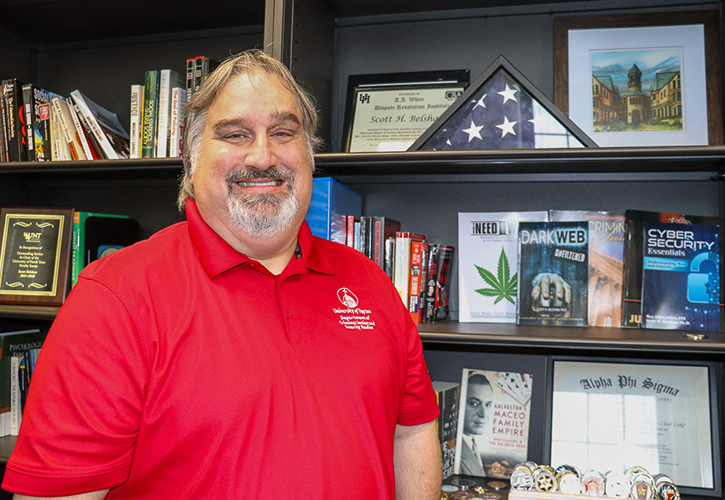College of Arts and Sciences Newsroom

New criminal justice and security studies chair brings expertise in cyber forensics
By Dave Larsen
Scott Belshaw, a criminologist with expertise in digital forensics and cyber security, joined the University of Dayton faculty as professor and chair of the Department of Criminal Justice and Security Studies.
Belshaw comes to UD from the University of North Texas, where he was founding director of the UNT Cyber Forensics Lab. The lab provides forensic analysis of cell phones, tablets and laptops for law enforcement agencies, and trains local and federal partners on trends in digital forensics, financial crimes and the “dark web” — hidden parts of the internet only accessible via specialized web browsers.
Before receiving his doctoral degree, Belshaw owned and operated a private investigation and criminal justice mitigation consulting firm in Houston. He also worked as a district and county court probation officer, following eight years in the U.S. Navy and Naval Reserve as an operations specialist and platoon squad leader.
Belshaw said his experience working in the criminal justice field benefits students.
“I teach a lot of ethics courses and I tell the students about ethical dilemmas I had — not that some author wrote about in a book, but issues I confronted when I was in the field,” he said. “It’s taking what I learned in the public-private sector and applying it to the students in teaching them, so they know what to expect when they get out there.”
In 2021, criminal justice studies at UD transitioned from an interdisciplinary program to a department within the College of Arts and Sciences to increase its visibility in the region, improve faculty and student recruitment, and better reflect the homeland security and cyber security aspects of its curriculum.
In addition to Belshaw, the department added two new assistant professors of practice this fall: Jaime Carazo, former special agent in charge of the Secret Service’s Cincinnati division, and Mark Visger, a former cyber law professor at the U.S. Military Academy at West Point.
Belshaw grew up “around the astronauts and astronaut’s kids” in Houston. His father, a NASA engineer, received the Presidential Medal of Freedom in 1970 as part of the Apollo 13 mission operations team.
After a disappointing freshman year in college, Belshaw’s father urged him to join the Navy. He served aboard a guided missile cruiser and a submarine tender, and is a veteran of Operation Desert Storm.
Realizing he “didn’t want to live on a ship the rest of my life,” Belshaw returned to school and earned a bachelor’s degree in social science/psychology from the University of Houston. He also holds a master’s in liberal arts from Houston Baptist University, a master’s in criminology from University of Houston-Clear Lake, and a doctorate in juvenile justice from Prairie View A&M University.
His books include The Dark Web: Unfiltered, The Need for Weed: Understanding Marijuana Policy and Galveston’s Macco Family Empire: Bootlegging and the Balinese Room. He also co-wrote several textbooks, including Criminal Justice Ethics and Cyber Security Essentials: Understanding Risks and Controls.
The Dark Web: Unfiltered II, which is intended to demystify the nefarious online world, is due in January 2024.
“That’s a research project I’ve been working on for a number of years, helping law enforcement with the idea of what the dark web is and teaching students about how the dark web works,” he said.
Since arriving on campus in August, Belshaw has met with Dayton Police Chief Kamran Afzal and Montgomery County Probation Director Carlos Walker about partnering with them on research and helping with questions they might have.
“I look at the University as the think tank for the community,” Belshaw said.
After 15 years at UNT — one of the nation’s largest universities — Belshaw has high praise for UD’s Department of Criminal Justice and Security Studies.
“This place sends more students to federal internships and federal jobs than any place I’ve ever seen,” he said. “I think it has to do with the relationships this department and UD have with federal agencies. Federal jobs are hard to get, but this place sends students to them all the time — way more than we ever did at North Texas, which has 47,000 students.”
Belshaw succeeds Martha Hurley, who served as criminal justice and security studies director and department chair from 2017 to 2023.
Search committee co-chair Stacey Siekman-Hall said their selection was guided by a commitment to academic excellence, innovation and a dedication to advancing the mission of the criminal justice and security studies department.
“Dr. Belshaw possesses a unique set of skills, experiences and perspectives in digital forensics and cyber security that align exceptionally well with the CJSS department,” said Siekman-Hall, lecturer and experiential learning coordinator. “We are excited to welcome Scott to the University of Dayton and look forward to seeing his leadership and expertise shape the future of the CJSS department.”
Siekman-Hall co-chaired the search committee with Jefferson Ingram, professor of political science. The committee also included criminal justice and security studies assistant professors Mark Morgan and Andrew Thompson, and lecturer Susybel Kallsen.
For more information, visit the UD Department of Criminal Justice and Security Studies website.
